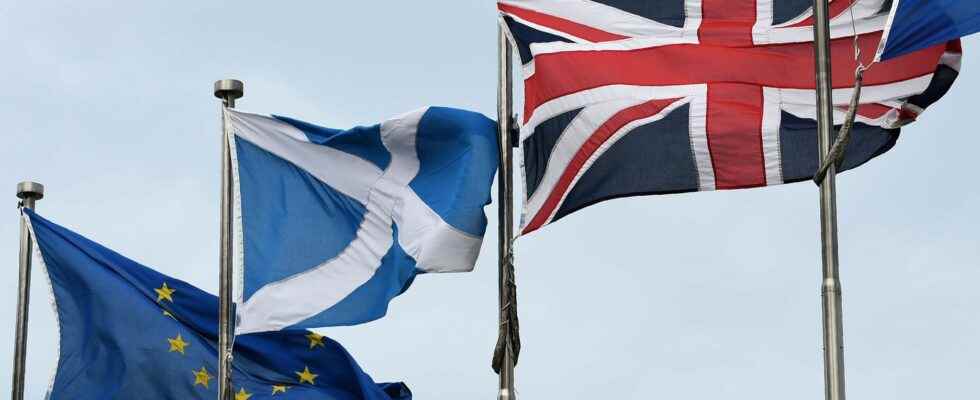The showdown between London and Edinburgh continues. And it is a law on gender change that pays the price. Adopted on December 22, 2022 by the Scottish Parliament, this law aims to facilitate the recognition of gender reassignment. The text removes the requirement for a medical and psychiatric diagnosis when applying for a gender recognition certificate.
It also reduces the period an applicant must live in their acquired gender from two years to three months, with an additional three-month reflection period, and raises the minimum age to apply to 16 (from 18 previously). this certificate.
The government of British Conservative Prime Minister Rishi Sunak blocked this law on Monday January 16, using for the first time a provision of the Scotland Act 1998, Article 35, governing the division of powers between London and Edinburgh. Certain competences are thus attributed to the local assembly of Scotland, such as in education or health, while London retains some in defense and others are shared.
London accused of “weakening” the Scottish Parliament
This decision comes two months after the British Supreme Court ruled that Scotland could not hold a new independence referendum without London’s agreement. The Conservative government is totally opposed to a vote after the 2014 vote which saw 55% of Scots refused to leave the United Kingdom. Supporters of a new referendum believe that Brexit, which the Scots opposed by 62%, has changed the situation, rekindling tensions. “This standoff offers a boost to the separatists”, reports the Guardianas spotted by Courrier International.
On Tuesday, Scottish First Minister Nicola Sturgeon, leader of the independentist Scottish National Party (SNP), accused London of using the gender change law to “weaken” the Scottish Parliament. “There is no good faith” in the attitude of the British government, she told the BBC, accusing it of being “increasingly hostile towards the Scottish Parliament”. “This is a frontal attack on our democratically elected Scottish Parliament and its ability to make its own decisions on devolved issues,” Nicola Sturgeon tweeted.
Nicola Sturgeon, however, moderated previous remarks calling for the next legislative elections to be a de facto referendum on Scottish independence, which had not won unanimity in the ranks of the SNP.
For his part, the independentist newspaper The National displayed his anger, as noted International mail. “This is a direct attack by the United Kingdom on the Parliament of Scotland,” he denounced on Wednesday.
A legal battle looms
A legal battle is now looming: the Scottish government wants to go “before a court” to defend its law, but also “the institution that is the Scottish Parliament, the ability of Scottish parliamentarians, democratically elected, to legislate in their areas of skills”.
Before the House of Commons, the Minister responsible for Scotland Alister Jack for his part again defended, on Tuesday, the legal bases of the British decision, denouncing “those who seek to politicize this decision by saying that it represents a kind of of constitutional contempt”, against a background of heckling animated by the SNP.
He assured that the government had not taken this unprecedented decision “lightly”, calling on the Scottish executive to modify its text. “The law risks creating significant complications by creating two gender recognition regimes within the UK,” he said. “If someone is born female and then identifies as male in Scotland, that change would not be recognized as such elsewhere in the country,” explicit The Daily Telegraph.
The Conservative government is in favor of gender recognition only being possible from the age of 18, Downing Street said. The Labor opposition, which Nicola Sturgeon accuses of being too timid in the face of the Conservatives, criticized the government for not having sought a compromise with Edinburgh further upstream.
A bill will ban all conversion therapies
The text has sparked a wave of criticism, from best-selling writer J. K Rowling to the UN special rapporteur on violence against women, with opponents fearing that loopholes could allow men easier access to spaces reserved for women.
According to The Daily Telegraph, “these bickering about mere constitutional technicalities obscures the substance of the matter”. Indeed, the triggering of Section 35 “prevents any debate in Westminster, for the time being, about the scope of transgender rights.”
The British government announced on Tuesday that it will soon introduce a bill to ban all conversion therapies, including those aimed at transgender people. A decision hailed by associations after an outcry aroused in the spring of 2022 when he had initially renounced to prohibit these practices which claim to be able to change a person’s sexual orientation or gender identity.
